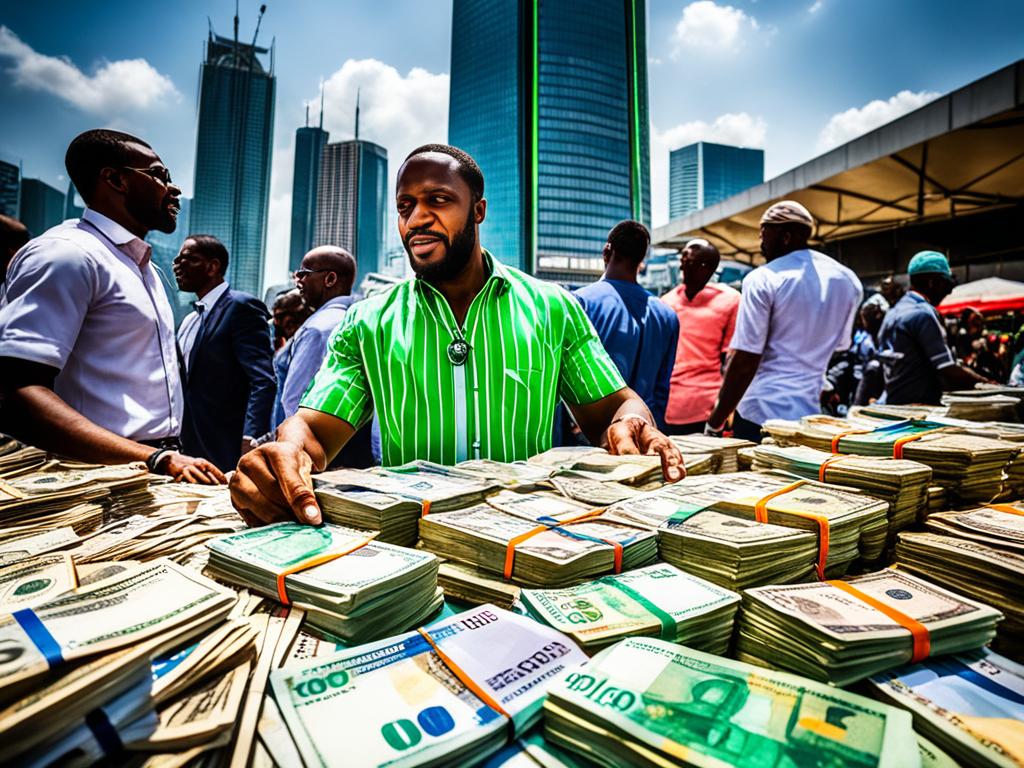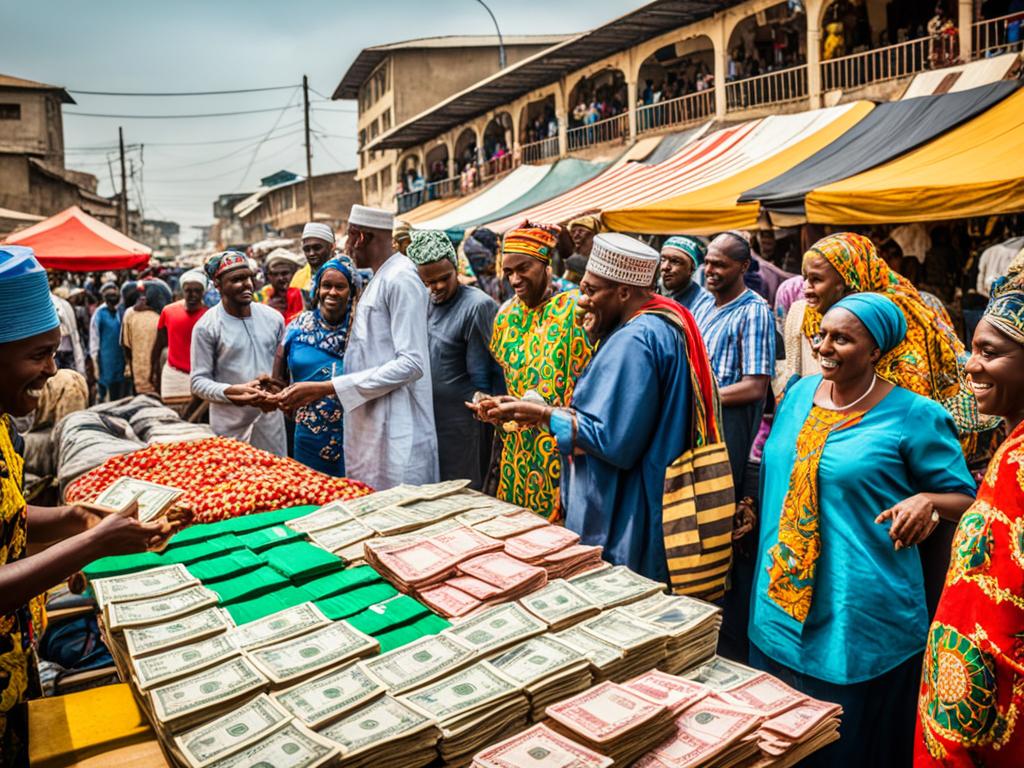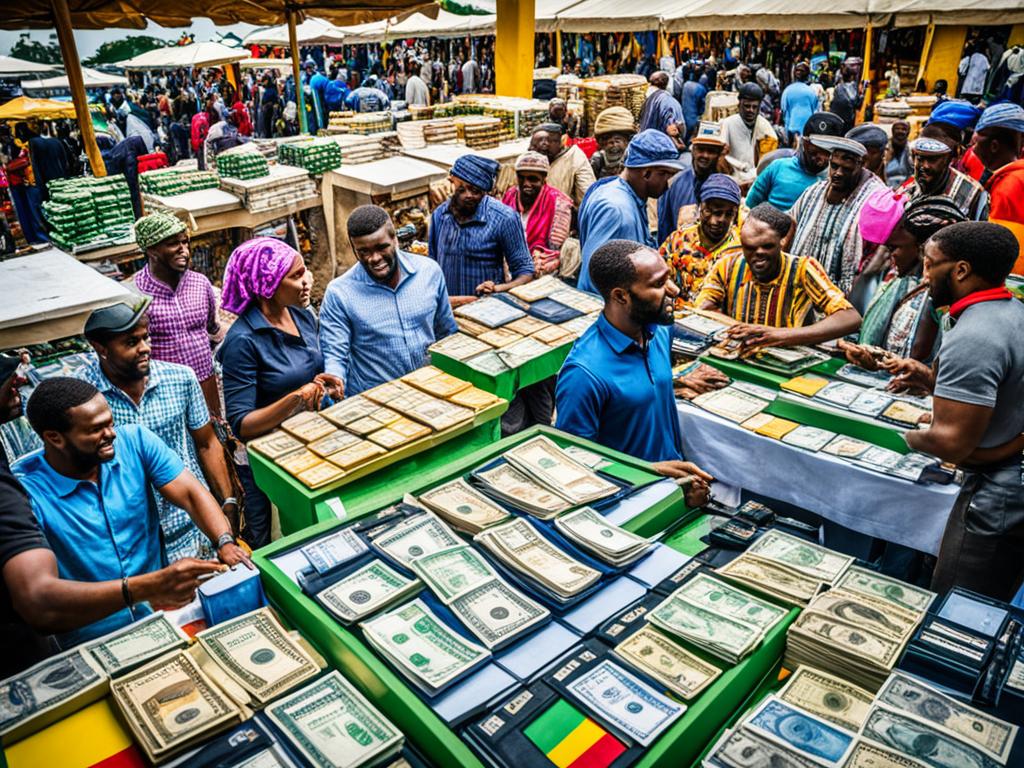
Foreign Exchange in Nigeria
Nigeria’s foreign exchange market is key to its economy. It helps with international trade, investment, and money transfers. This article explores the foreign exchange (forex) in Nigeria. It looks at the main players, Central Bank policies, and the importance of remittances and diaspora contributions.

Understanding currency trades and exchange rates in Nigeria is vital for businesses, investors, and individuals. It helps them with cross-border activities. By learning about the foreign exchange market, readers will know what affects the naira’s value. They will see the Central Bank of Nigeria’s (CBN) role in forex policies and the different groups involved.
This article aims to give readers a better grasp of Nigeria’s foreign exchange world. It helps them make informed choices and use the chances offered by the forex market.
Understanding Foreign Exchange in Nigeria
Foreign exchange, also known as forex, is key to Nigeria’s economy. It’s about trading one currency for another. This helps with international trade, investment, and growth. Nigeria depends a lot on fx, which affects many areas of its economy.
What is Foreign Exchange?
It is a global market where different currencies are traded. It lets people, businesses, and governments buy and sell across borders. This market is huge, with trillions of dollars changing hands every day.
The Role of Foreign Exchange in Nigeria’s Economy
In Nigeria, fx is vital. It helps with international trade by letting the country buy goods and services it can’t make itself. It also helps bring in foreign investment. Plus, it lets the government pay off debts and keep the economy stable.
The ups and downs of the foreign exchange rate can really affect Nigeria’s economy. It can change inflation, how much people can buy, and how competitive local industries are. So, the government and experts always keep an eye on foreign exchange’s role in Nigeria’s economy.

Knowing how fx works and its effects on Nigeria is important for everyone. By understanding the forex market, Nigeria can use its chances and tackle its challenges. This can help the country grow and develop its economy.
Foreign Exchange in Nigeria: A Comprehensive Overview
Nigeria’s foreign exchange market is complex and always changing. It has different exchange rates and important players. This overview aims to explain how the country’s forex system works.
The official and parallel exchange rates are at the center of Nigeria’s forex market. The official rate is set by the Central Bank of Nigeria (CBN). It’s used for formal deals. The parallel market rate changes with supply and demand. Knowing these rates is key to understanding Nigeria’s forex.
Many things affect exchange rates in Nigeria. These include the economy, government policies, and global trends. The CBN’s actions also shape the forex market.
| Exchange Rate Mechanisms | Key Participants |
|---|---|
| Official Exchange RateParallel Market Rate | Central Bank of Nigeria (CBN)Commercial BanksForex BureausImporters and ExportersIndividuals and Businesses |
The fx market in Nigeria is complex and full of life. The official and parallel exchange rates are key to the economy. Knowing who and what affects these rates helps in understanding foreign exchange in Nigeria.

The Central Bank of Nigeria’s Forex Policies
The Central Bank of Nigeria (CBN) is key in managing the country’s foreign exchange (forex) market. It sets policies to keep the forex market stable and in control. This is vital for Nigeria’s economic growth.
Interbank Foreign Exchange Market
The Interbank Foreign Exchange Market is a big part of the CBN’s forex management. It’s where banks and authorized dealers trade foreign currencies. The CBN helps keep this market running smoothly. The rates set here are the standard for Nigeria’s official exchange rate.
Official and Parallel Market Rates
In Nigeria, there are two main exchange rates: the official and the parallel market rate. The official rate is set by the CBN for its forex dealings with authorized dealers. The parallel market rate changes with supply and demand in the informal market, often differing from the official rate.
| Exchange Rate | Key Characteristics |
|---|---|
| Official Rate | Determined by the Central Bank of Nigeria, used for official transactions |
| Parallel Market Rate | Fluctuates based on supply and demand in the informal market, often different from the official rate |
The difference between the official and parallel market rates has sparked debate and policy changes by the CBN. The goal is to make exchange rates more consistent and transparent under central bank of nigeria forex policies.

Foreign Exchange in Nigeria: Key Players and Participants
The Nigerian foreign exchange (forex) market is lively and complex. It has many key players and participants. Commercial banks and forex bureaus are at the forefront, each vital for the market’s smooth operation.
Commercial Banks and Forex Bureaus
Commercial banks in Nigeria are key for forex transactions. They help individuals, businesses, and institutions with their foreign exchange needs. The Central Bank of Nigeria (CBN) authorizes them to trade foreign currencies, offering good rates and services.
Forex bureaus also play a big role in Nigeria’s forex market. They focus on retail services for individuals, small businesses, and travelers. These bureaus make exchanging currencies easy, with good rates and convenient locations.
| Key Players | Functions | Impact on Forex Landscape |
|---|---|---|
| Commercial Banks | Authorized by CBN to buy and sell foreign currenciesOffer a wide range of forex-related servicesFacilitate international trade and investment | Serve as the primary conduits for foreign exchange transactions, ensuring the smooth flow of the forex market |
| Forex Bureaus | Specialized entities focused on retail forex servicesCater to the needs of individuals, small businesses, and travelersOffer convenient currency exchange options | Complement the efforts of commercial banks by providing accessible forex services to a wider customer base |

Commercial banks and forex bureaus work together in Nigeria’s forex market. They keep the market stable and efficient. By meeting the needs of many, they help the Nigerian economy grow.
Remittances and Diaspora Contributions
Nigeria’s fx market is greatly affected by remittances and contributions from its diaspora. These funds are key to supporting the Nigerian economy and its foreign exchange situation.
Remittances are money sent by Nigerians abroad to their loved ones back home. In 2021, remittances nigeria reached over $25 billion. This is a big part of Nigeria’s Gross Domestic Product (GDP).
The diaspora community does more than send money. Diaspora contributions nigeria also include investments, charity work, and sharing skills and knowledge. These efforts help Nigeria’s economy grow and keep its foreign exchange stable.
These diaspora-driven funds have a big impact. They help to:
- Reduce poverty and make life better for families
- Help small businesses and new entrepreneurs
- Give a steady source of foreign exchange for imports
- Support the building of important infrastructure and social services
Nigeria is looking for ways to boost its fx market The role of remittances and diaspora contributions will be key in shaping its economic future.

Conclusion: Embracing the Opportunities of Foreign Exchange in Nigeria
The world of foreign exchange in Nigeria is complex but full of chances. The Central Bank of Nigeria and various players like commercial banks and forex bureaus make it easier to trade currencies. This setup helps people and businesses to understand and use the fx market.
Remittances and money from abroad play a big role in Nigeria’s economy. They bring in a lot of foreign currency. By learning how to use these resources, Nigerians can grow the economy, make international deals, and open up new financial doors.
By taking advantage of fx in Nigeria, people and companies can succeed globally. They can make the most of cross-border payments, spread out their investments, or use changes in exchange rates. The fx market is full of chances for those who are smart and take action.
FAQ
What is foreign exchange?
Foreign exchange, also known as “forex” or “FX,” is when one currency is traded for another. It’s about making money from changes in currency values. People buy, sell, and trade currencies to profit from these changes.
What is the role of foreign exchange in Nigeria’s economy?
In Nigeria, foreign exchange is very important. It helps with international trade, investment, and moving money around the world. It lets Nigeria join the global financial world. Having enough foreign exchange is key for bringing in goods and services and for foreign investors to make profits.
What are the key aspects of the foreign exchange landscape in Nigeria?
Nigeria’s foreign exchange scene has many parts. These include the interbank market, official and parallel exchange rates, the CBN’s role, and the part played by commercial banks and forex bureaus.
How does the Central Bank of Nigeria (CBN) manage the forex market?
The Central Bank of Nigeria (CBN) is a big part of the forex market. It runs the Interbank Foreign Exchange Market, sets exchange rates, and uses policies to keep the naira stable and the market orderly.
What is the difference between the official and parallel market exchange rates in Nigeria?
The official rate is set by the CBN for formal deals like international trade and government work. The parallel market rate, or “black market” rate, comes from the informal market and is usually higher than the official rate.
Who are the key players in the Nigerian foreign exchange market?
Commercial banks, forex bureaus, and the Central Bank of Nigeria (CBN) are the main players. They help with currency exchanges and offer forex services to people and businesses. The CBN is the main regulator and big player in the market.
What is the role of remittances and diaspora contributions in Nigeria’s foreign exchange market?
Remittances and contributions from abroad are big for Nigeria’s forex market. Money sent by Nigerians living overseas, known as diaspora remittances, brings in a lot of foreign exchange. It helps families and boosts the economy.


Foreign exchange is very good and will help to Elevate the economic growth of the country.